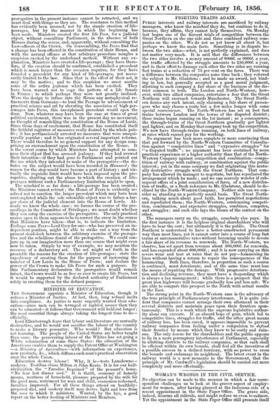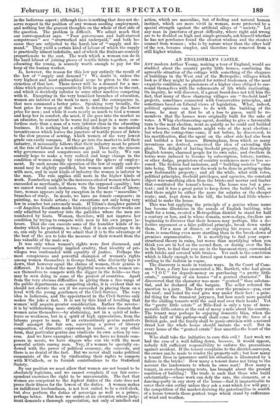WOMAN'S WRONGS IN THE CIVIL SERVICE.
No objection can be made to the manner in which a fair corre- spondent challenges us to look at the graver aspect of employ- ment for women, after having glanced at the ludicrous side of a recent appointment in the State Paper Office. The grave side, indeed, disarms all ridicule, and might reduce us even to sadness. Yet the appointment in the State Paper Office still presents itself
in the ludicrous aspect ; although there is nothing that does not de- serve respect in the position of any woman needing employment, and nothing but the gravest thoughts on the whole of that side of the question. The problem is difficult. We admit much that our corrrespondent says. " Poor governesses and half-starved sempstresses" are " overworked and underpaid," and both be- cause they are subjected to the harsh law of " supply and de- mand." They yield a certain kind of labour of which the supply is practically almost indefinite, and of which the fruits are scarcely proportionate to the cost. The work which a woman can do in the hard labour of joining pieces of textile fabric together, or of educating the young, is scarcely worth enough to pay for the keep of the human worker. Is, however, the reason for this low pay entirely the result of the law of " supply and demand" ? We doubt it, unless. the very highest and most philosophical scope be given to the con- struction of that law. There never will be a demand for a ma- chine which produces comparatively little in proportion to the cost, and which is decidedly inferior to some other machine competing with it. Excepting in the very humblest branches of education, women are inferior at the work to men; and the consequence is, that men command a better price. Speaking very broadly, the best price for women at this work is determined by the lowest price for men ; and while it costs nearly as much to feed a woman and keep her in comfort, she must, if she goes into the market as an educator, be content to be worse fed and kept in a more com- fortless state than a man of a very inferior class in the educating business. It is nothing but a striking deficiency in mechanical inventiveness which leaves the juncture of textile pieces of fabric to the slow process of sewing, which women of the very lowest grade can easily compass. If they go into the market to sell their industry, it necessarily follows that their industry must be priced at the rate of labour for a workhouse girl. These are the reasons why governesses and sempstresses are paid so badly. We can scarcely hope to make a very radical and large change in the condition of women simply by extending the sphere of employ- ment. By such means the operation of the law of supply and de- mand may be slightly modified, but women must still compete with men, and in most kinds of industry the woman is inferior to the man. The rule applies still more in the higher kinds of work. Numberless might be the instances cited of women who have succeeded as merchants, if there were the supposed equality ; but we cannot recall such instances. On the broad walks of litera- ture, woman appears only by exception in the more " masculine " branches of study. In music, we have no female composers ; in painting, no female artists ; the exceptions not only being very few in number but extremely weak. If Titian's daughter painted —if Angelica Kauffman made historical pictures—their works are only admitted by courtesy into the galleries where the men are numbered by hosts. Woman, therefore, will not improve her -condition by trying to compete with man in his own proper la- bours. That she can execute some of the humbler kinds of in- dustry which he performs, is true ; that it is an advantage to do so, can only be granted if we admit that it is to the advantage of the best of the sex to take the measure of their reward from the less valuable of the male sex.
It was only when women's rights were first discussed, and when novelty necessarily implied crudity, that identity of pri- vileges was confounded with equality of justice. Perhaps the most conspicuous and powerful champion of woman's rights among women themselves is George Sand, who distinctly lays it down, that however equal the claims of women, their genius is different. It is indeed the most frightful waste when women un- sex themselves to compete with the digger in the fields—as they may be seen doing in some of the poorest of countries. Apart from the very obvious difficulties in giving them a free range of the public departments as competing clerks, it is evident that we should not elevate the sex if we succeeded in placing them on a level with the young gentlemen of the Civil Service. The very idea is ludicrous, and the appointment in the Civil Service only makes the joke a- fact. It is not by this kind of levelling that women ' will acquire greater consideration. Rather the reverse : it is biwithdrawing more strictly within their own domain that women raise themselves—by abstaining, not in a spirit of indo- lence or weakness, but in a spirit of high appreciation, from the labours proper to man. If an extraordinary genius manifests itself amongst the fair sex, conveying a power of literary composition, of dramatic expression -
m music, or in any other form, that particular genius can vindicate its own action by suc- cess. And we have examples : although we have no female com- posers in music, we have singers who can vie with the most powerful artists among men. Nay, if a woman be specially en- dowed with the power of political economy, she succeeds, and there is no denial of the fact. But we never shall make political economists of the sex by vindicating their rights to compete with ll'Culloch, or to furnish contributions to the Statistical Society.
By our position we must allow that women are not bound to be absolutely logicians, and we cannot complain if our fair corre- spondent exercises the right to be unreasonable. The fact that women are competent to the highest duties of the state does not prove their fitness for the lowest of the duties. A woman makes an indifferent husbandman, is not best suited to be a civil clerk, but does perform the duties of sovereign as well as a prince, perhaps better. But here we arrive at an elevation where judg- ment demands a thorough appreciation, not only of intellect and action, which are masculine, but of feeling and natural human instinct, which are more vivid in woman, more protected by a special strength against the artificial alloys of "society." Let any man in junctures of great difficulty, where right and wrong are to be decided on high and simple grounds, ask himself whether he has not perchance found the clearest wisdom and the stoutes t counsel from woman ; who is by nature wiser than the other half of the sex, because simpler, and therefore less removed from a still higher wisdom.



























 Previous page
Previous page